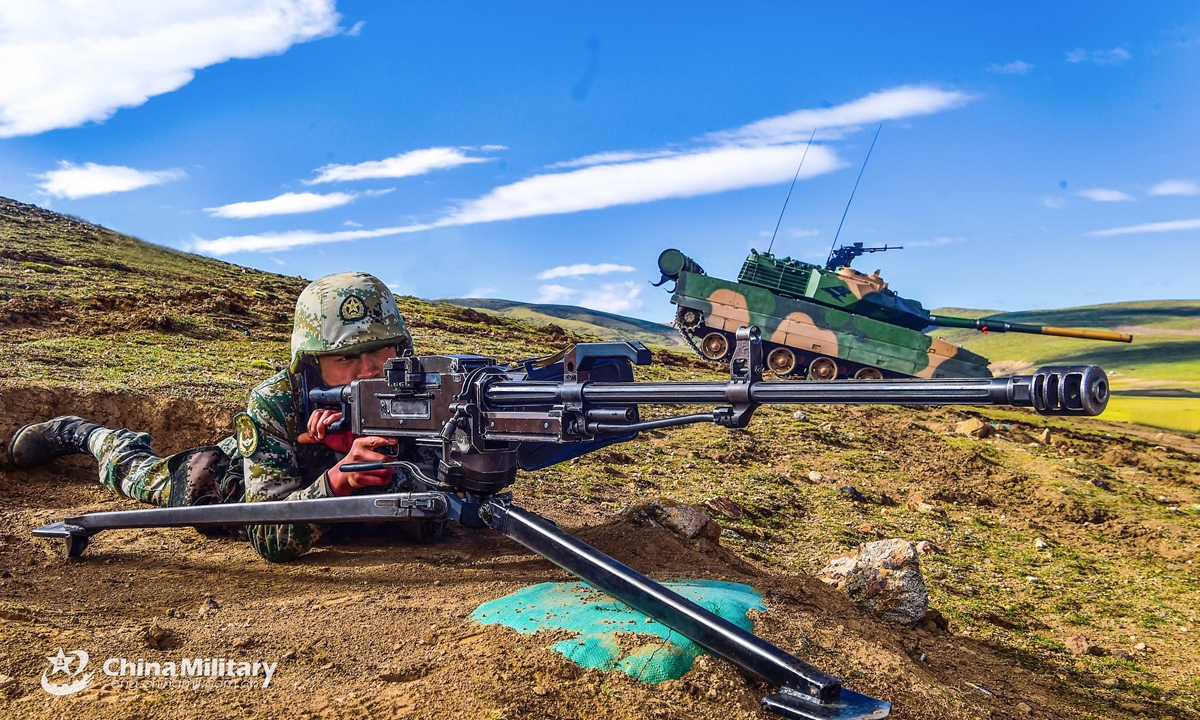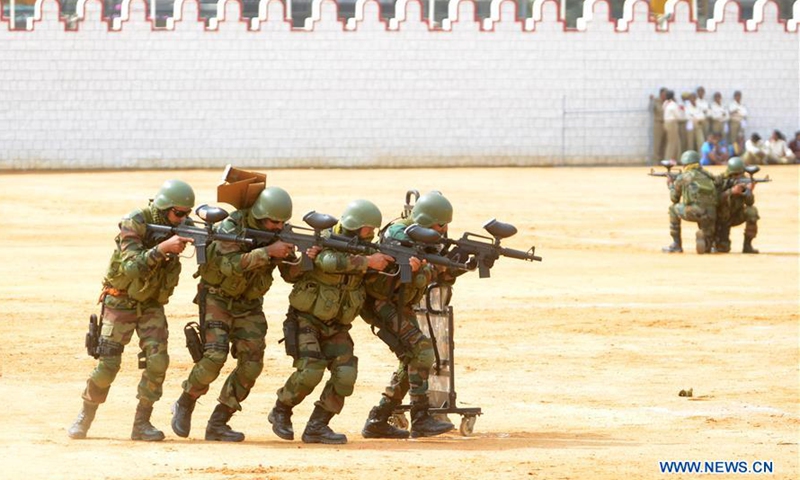India will pay heavy price if it 'miscalculates China'
By Yang Sheng Source:Global Times Published: 2020/6/24 23:45:58

A gunner targets at mock enemy’s observation post with a machine gun while a tank moves forward during a coordinated exercise recently. Photo:China Military
India's nationalism is growing sharply following the India-instigated border clash in the Galwan Valley, and the Indian foreign ministry and media are still spreading misinformation about the incident. Chinese experts warn Indians' boycotting Chinese products will bring no good to India.
China's foreign and defense ministries on Wednesday both released statements detailing the China-India border clash, refuting misinformation from the Indian government and its media.
Zhao Lijian, a spokesperson of China's Foreign Ministry, said at a routine daily press conference on Wednesday, "Since April this year, the Indian border troops have unilaterally built roads and bridges at the LAC (line of actual control) in the Galwan Valley. China has lodged representations and protests on multiple occasions.
Early on May 6, Indian border troops crossed the LAC by night and trespassed into China's territory."
Wu Qian, a spokesperson of China's Defense Ministry, said at another routine press conference on Wednesday that under the efforts made by the Chinese side, and after communication through multiple channels, the two sides held a corps commander-level meeting on June 6, and both agreed to take concrete measures to ease tensions.
"The Indian side has promised not to cross the Galwan Valley to patrol and build facilities," and the both sides have agreed to retreat their troops from the area, Wu said. "But it was shocking that Indian troops publicly violated the agreement, broke their own promise and crossed the LAC to provoke the Chinese side on June 15."
"When Chinese military troops arrived to negotiate, they were suddenly attacked by Indian troops, and that led to a physical fight between the two sides and caused casualties," Wu said.
Chinese troops took decisive measures in self-defense and firmly fought back against the violent acts by Indian troops to effectively safeguard national sovereignty and territorial integrity, Wu noted.
"The incident was caused by India's violation of the agreement and unilateral provocation, and it occurred on the Chinese side of the LAC which is recognized by both sides. The Indian side should take full responsibility for causing the fight. China urges India to strictly punish the perpetrators of the incident, strictly control its troops on the frontline, and ensure similar incidents won't take place again," Wu stressed.

Indian army commandoes display their skills during the 70th Republic Day parade in Bangalore, India, Jan. 26, 2019. India celebrated its 70th Republic Day on Saturday.File photo:Xinhua
When asked by an Indian journalist why China had issued this statement, Zhao said the Indian Foreign Ministry and Indian media have released too much fake news in recent days. The statement intended to clear up rumors and help the world to know the truth.
According to China's Foreign Ministry, Hong Liang, director-general of the Department of Boundary and Ocean Affairs of the Foreign Ministry, on Wednesday chaired a video meeting on border affairs with Naveen Srivastava, joint secretary of the East Asia Division of the Ministry of External Affairs of India. Diplomatic, defense and immigration representatives from the two sides attended the meeting.
Both sides exchanged views on the latest border issue in a candid, in-depth manner, and implemented the agreement reached by the foreign ministers of the two countries on June 17.
They actively coordinated with the two militaries to implement the agreement reached at the corps commander-level meetings on June 6 and June 22 to solve their issues through dialogue.
A military expert at a Beijing-based military academy who asked to remain anonymous told the Global Times that it is impossible for China to provoke India, as China is focusing on fighting the COVID-19 at home and dealing with strategic pressure from the US.
"Some Indian decision makers might have believed this was a good chance for India to occupy some territories in the border region, so they took unilateral actions to cross the LAC and build facilities. And they might have thought we would not dare to fight back. The 20 Indian soldiers' lives are the price they paid for their foolish attempt," he said.
Following the clash, nationalism and anti-China sentiment have been rising sharply in India, and many Indian people have launched a boycott of Chinese products. Some are even destroying their China-made products like televisions and phones. The Chinese public has found humor in such acts, with some commenting online that "as long as you pay, you can destroy as much as you want."
A mocking comment on Sina Weibo read: "We are jealous because we might also want to boycott something from India, but we have nothing from India here. Does anyone know what is made in India?"
Chinese analysts said that for China, the Indian market is not significant, but the Indian market needs Chinese products as Chinese firms can provide good quality and affordable prices for Indian customers. It is entirely irrational for Indian people to boycott Chinese goods.
Lü Xiang, a research fellow at the Chinese Academy of Social Sciences in Beijing, told the Global Times that the Indo-Pacific strategy initiated by the US government might have encouraged Indian decision makers as they thought being tough to China would curry favor with the US.
"In 1962, India made very a similar judgement in a similar situation. China had tensions with two super powers - the US and the former Soviet Union - and was also suffering from domestic issues such as poverty and famine, so Indians thought it could be their best chance to seize Chinese land," Lü said.
Chinese analysts said that even if the US could provide help and that could well be in the form of US arms sales to India. But a good relationship with China could provide more economic benefits to India, therefore forging a warm relationship with its giant neighbor and seeking win-win cooperation is in the best interest of India.
Posted in: DIPLOMACY